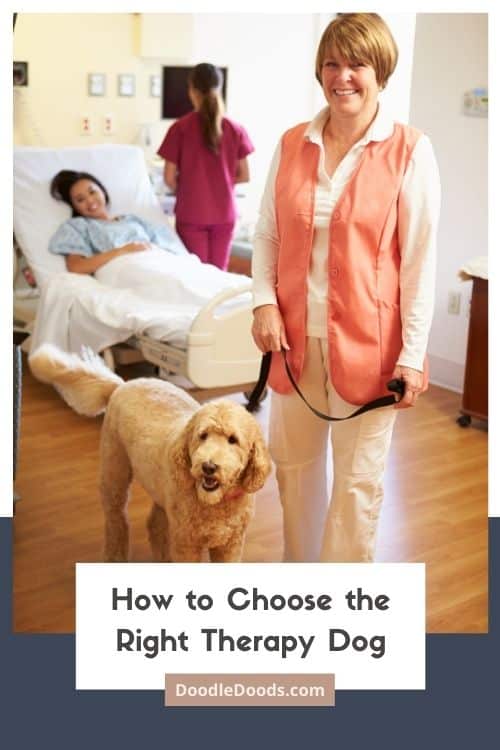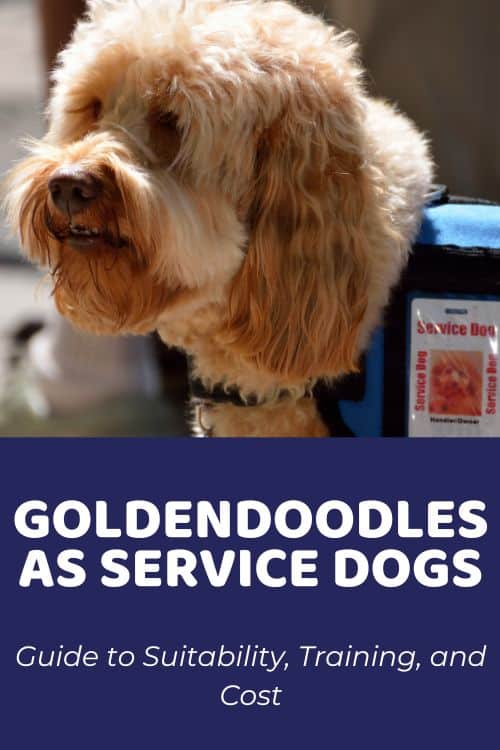A therapy dog can improve a person’s life immensely. Not only does a therapy dog provide companionship and love, but a therapy dog also provides its owner with a purpose and routine. All these attributes benefit someone struggling with mental health disorders such as depression, anxiety and/or PTSD.
However, the benefits of a therapy dog don’t magically happen! To be the most beneficial, therapy dogs and their owner need to match personality-wise, exercise-wise, and training-wise. It can take months or years to make the right match.
In this article, we are going to go over the top things to consider if you are looking for a therapy dog and are trying to find the perfect match.
What is a Therapy Dog?
The first thing to understand is what a therapy dog is and does. A therapy dog provides emotional and physical support to individuals. Individuals who regularly cope with stress, anxiety, depression, PTSD, and other mental health and emotional disorders find comfort and healing in therapy dogs.
Therapy dogs can help their owners feel less isolated and strong enough to take on the larger world around them. Therapy dogs still need exercise, routine, and playtime. These activities promote healthy habits and relaxation in their owners.
Types of Breeds to Consider
A therapy dog’s breed is a really important consideration when choosing the right therapy dog. Different breeds of dogs have different temperaments, and some breeds are not suitable for life as therapy dogs. Some breeds may be too hyperactive, aggressive, or too high maintenance.
Some of the best breeds to look for when looking for a therapy dog include:
- Border collies
- Poodles
- Doodles
- Golden retrievers
- Greyhounds
- French bulldogs
- Labs
- Beagles
- Spaniels
- Bernese Mountain Dogs
One particular breed that we listed above makes exceptional therapy dogs, and those types of dogs are Doodles. Doodles are highly intelligent and also have a very calm and affectionate demeanor.
One of our therapy dog recipients described their Doodle as “sweet and silly, but he’s also learned his job.” Doodles can provide fun and laughter while also implementing what it was trained to do. A Doodle’s temperament is a main contributor to its ability to do this!
Even if you opt for another type of dog breed, knowing the temperament of the breed you choose is very important and will go a long way in finding the perfect fit.
The Facility/Breeder Matters!
When you are choosing a therapy dog, the facility or breeder you work with matters! A reputable facility or breeder will carefully screen each dog to ensure they have the right temperament and ability to complete the training required of a therapy dog.
The right facility will also make sure your therapy dog does not suffer from health issues that could affect their performance down the road. Not only that but top-notch facilities and breeders will also take the steps necessary to start training your future therapy dog.
Good facilities and breeders can also help you, the human, too. They will assess your needs and lifestyle, as well as your temperament to help match you to a dog that is right for you. These facilities will also give you the tools and techniques necessary to continue your dog’s training after it leaves the facility or breeder.
When you work with a professional team, they can help assess whether a breed or temperament fits you and your lifestyle. You don’t have to know everything about dogs or make the decision blindly with the right team behind you.
Be Patient and Take Your Time
When choosing the right therapy dog for you, it’s important to take your time! Don’t rush into the decision because these are the only dogs available in your area or because you’re excited to have a dog.
We hope that a therapy dog match is a lifetime partnership, and a lifetime partnership decision shouldn’t be made lightly. It’s okay to take your time, visit with dogs multiple times, and even explore therapy dog options in other locations if you are not finding a dog you connect with in your community.
Taking your time will ensure compatibility and will help you and your therapy dog develop a bond that is unmatched.
After all, the bond between the therapy participant and therapy dog is what will enhance the effectiveness of your therapy work! At the end of the day, you will know when you’ve found your match!
Determine Your Needs
Therapy dogs are not one-size-fits-all. Therapy dogs can be trained to address specific mental health disorders or ailments. You will want to make sure that your therapy dog can address your ailment whether that is physical or mental.
For example, a therapy dog may be trained to provide comfort and support to individuals with anxiety disorders, but may not have the necessary skills and training to work with individuals who have more severe or complex mental health conditions.
Similarly, therapy dogs may be trained to provide comfort and support to individuals with physical disabilities, but may not be able to provide the level of physical assistance required by individuals with more severe physical impairments.
One of our clients found out that a therapy dog could be trained to meet her specific needs. At first, she didn’t think it was possible, but she found her match in a psychiatric therapy dog.
She told us, “there is a special type of doggy who’s an actual service dog but trained to the needs of autistics, those with PTSD, anxiety/panic disorders, mental illness, etc.”
In short, you should seek out a therapy dog that is specifically trained in the area you need support to ensure that you two are a good fit!
Consider the Age of the Therapy Dog
Do you want an older therapy dog or a younger therapy dog? Age is important to consider when choosing the right therapy dog because it can impact the dog’s energy level, behavior, and adaptability to new environments.
Neither an older dog nor a younger dog is a bad choice, it all depends on you and what will be the most beneficial to your therapy! Younger dogs may have more energy and may be better suited to work with children and active individuals, as they may have more energy and enthusiasm for the work.
However, younger dogs may also be less experienced and may require more training and socialization to be effective in therapy work. If you are active, mobile, and looking to increase your own socialization, a young dog may be a great fit for you.
Older dogs, on the other hand, may have more experience and may be better suited to work with seniors or individuals with mobility issues, as they may have a calmer and more relaxed demeanor.
However, older dogs may also have less energy and may need more breaks during therapy sessions. It may take longer for an older dog to go through the training work necessary. Considering age is just one part of finding the right therapy dog fit.
The Home Environment Is Important, Too!
If you have children at home, or a chaotic home environment, you’ll want to choose a therapy dog that is able to handle those environments.
In addition, think about your physical demands such as whether you use mobility aids like a wheelchair or walker. It’s important to choose a dog that is comfortable and confident around individuals with different abilities.
Your home environment can impact your therapy dog’s training, well-being, and effectiveness at helping you through your therapy. In addition, you should consider the places you frequent other than your home, such as schools, hospitals, nursing homes, etc.
These environments can be stressful and unfamiliar to dogs, so it’s important to choose a dog that has a calm and confident demeanor and that is able to adapt well to new environments.
Conclusion
There are many factors to consider, including breed, age, home environment, and personal needs. It’s essential to take your time and carefully consider each of these factors to choose a dog that is well-suited to your therapy work and will be a good fit for you and your family.
Ultimately, the goal is to choose a therapy dog that meets your needs and that you feel a connection. A therapy dog bond is unlike any other bond. When you find the right fit, you won’t remember what your life was like before your therapy dog!
You should choose a reputable matching agency, facility, or breeder to help you assess your needs and that will introduce you to therapy dogs that match your lifestyle and personality. You don’t have to do this alone!
By taking the time and using the resources available to you to help you choose the right therapy dog, you can ensure that you and your dog can make a positive impact on the lives of others.
Ultimately, it’s important to remember that a therapy dog is more than just a pet; it’s a partner in your therapy work and a source of comfort and support to those in need.
Guest post contributed by Hill & Ponton.



